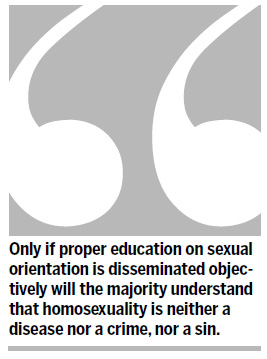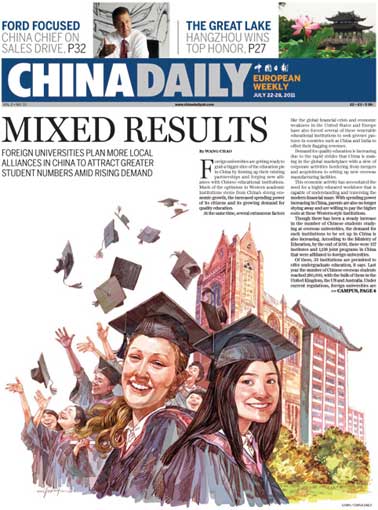Op-Ed Contributors
Debate: Homosexuality
Updated: 2011-07-25 07:52
(China Daily)
What is or what should be society's view about homosexuality? Two scholars and an activist come up with different answers.
Li Yinhe
Indifference has led to tolerance
Homosexuality has existed since prehistoric times across countries and cultures. But for a long time Chinese society has turned a blind eye to homosexuality and thus created an illusion that it is rare or simply does not exist in China. A few homosexuals do enter the public field of vision either seeking medical treatment or having committed a crime, thus aggravating the prejudice that homosexuality is a disease, crime or wrongdoing.
The Chinese Academy of Social Sciences (CASS) conducted a national survey over the phone in 2007 to determine the level of public acceptance of homosexuality. The 10-point questionnaire, based on random sampling, covered large and medium-sized cities on the Chinese mainland. The refusal rate to the survey was 12-13 percent in large cities and 7 percent in medium-sized ones.
The survey found that Chinese society, on the whole, is tolerant but some misunderstandings among people about homosexuality still refuse to die. The findings are as follows:
About 20 percent of the respondents said there was nothing wrong with being homosexual, 30 percent said there was something wrong with homosexuality, and nearly 40 percent said it was wrong. The answer of the rest of the respondents was ambiguous. In the United States, 43 percent of the people fully approve of homosexuality and 47 totally disapprove of it.
Whether we admit it or not, homosexuality is a reality across the world, and the visibility of homosexuals reflects how accepting a society is toward them. But the CASS survey found out that only 7.5 percent of the respondents admitted having known any homosexual.
In answer to the question, "whether you will make friends with a homosexual", more than 60 percent of the respondents said "yes" and only one-third responded in the negative. And despite the lack of understanding about homosexuality, most Chinese people are not averse to making friends with homosexuals.
One question was, should a known homosexual be allowed to take up a schoolteacher's job. The respondents who said "no" slightly outnumbered those saying "yes". French philosopher Michel Foucault writes: "A homosexual teacher should not present any more of a problem than a bald teacher, a male teacher in an all-female school, a female teacher in an all-male school " This means the CASS finding exposes people's fear of and prejudice against homosexuals.
When it came to "whether parents should require a school to replace a teacher who is a homosexual", more than half of the respondents stuck to their prejudice.
To the question, "whether movies and TV programs with homosexual themes should be cleared for public viewing" the respondents were clearly divided: 55 percent said "yes" and more than 40 percent responded in the negative.
With respect to equal employment rights for homosexuals, 91 percent of the respondents offered their support, exceeding the 65 percent in the US in 1983 and 84 percent in the 1996. Although many Chinese people disapprove of homosexuality, they favor equal employment rights for homosexuals, because working is the basic means of a human being's survival, and our moral baseline entails the respect for anothers' right to work.
To the question, "how would you respond to a family member coming out of closet", respondents showing full acceptance or zero tolerance accounted for only a small proportion. Three-fourths of them said they would "tolerate" it if they had prior inkling about the homosexual tendencies of the family member.
On legislation for same-sex marriage, the CASS respondents seemed more conservative with 70 percent rejecting the idea, compared with 58 percent in the US.
The CASS survey was different from a similar online survey, which found 60 percent of the Chinese respondents approved of same-sex marriage. The gap probably results from the fact that a large percentage of Chinese netizens are young, well-educated and urban dwellers.
To the last question, "whether homosexuals were equal to heterosexuals", rationality once again took the upper hand, with 80 percent of the respondents agreeing that they were equal and only 15 percent saying they were inferior.
Judging from the findings of the CASS survey, Chinese society as a whole is tolerant toward homosexuality. People are not critical of homosexuality as long as homosexuals do not harm others or commit crimes.
Besides, Chinese people take pride in their traditional culture that has a long history, and are not worried about their culture being "poisoned" by homosexuality. In this sense, Chinese people's indifference to homosexuality seems to be the reason for their tolerance.
The author is a research scholar with the Institute of Sociology, Chinese Academy of Social Sciences.
Lin Hong
Discussion reflects social progress

Actress Lu Liping recently re-posted a self-proclaimed priest's anti-homosexual message on her micro blog, which says gays and lesbians are a "shameful" community of "sinners". Lu's attitude and her use of a "priest" to launch a tirade against homosexuals have outraged many people.
To some extent, social attitudes toward homosexuality mirror the development of gender equality and the level of harmonious diversification in a society. In a sense, it is related to a society's progress, too.
Since the end of the last century, the government has taken two major steps to remove the stigma attached to homosexuals: declaring that homosexuality is neither a criminal offense nor a mental disease. In 1997, the revised Criminal Law excluded homosexuality from the realm of hooliganism. And in 2001, homosexuality was removed from the list of Classification and Diagnostic Criteria of Mental Disorders.
But moral neutralization of sexual orientation has not made as much progress. The problem is that it cannot be done only by fixing or introducing policies. The hate or taboo factor can be eliminated only through sustained reform of sexual education. This is not to say that homosexuality should be promoted. Society needs understanding, not promotion.
Since a person's attitude toward something or some event reflects his/her state of mind, Lu's attitude prompts us to dig deeper into certain aspects.
First, many people hate homosexuals because they do not understand sexual orientation. In other words, prejudice and discrimination against homosexuals are rooted in ignorance. So only if proper education on sexual orientation is disseminated objectively will the majority understand that homosexuality is neither a disease nor a crime, nor a sin as Lu would make us believe.
Second, though the acceptance and tolerance level of people toward homosexuality has increased - netizens arguing against and condemning Lu prove this - many people still discriminate against and misunderstand homosexuals. Even today, few people will openly disclose that they are gays or lesbians, which indicates that social understanding and tolerance are still limited.
The controversy surrounding homosexuality has intensified because some people have launched personal attacks against Lu, which is wrong, because irrational criticism of neither Lu nor homosexuals will help promote understanding of diverse sexual orientation.
Third, the rate of social concerns and arguments on the issue reflects the freedom of speech Chinese people enjoy and the openness of society. It also shows that Chinese people are open to debates on the subject.
In short, the debate on homosexuality, considered a taboo even a couple of decades ago, indicates the progress Chinese society has made.
The author is an associate professor at the Department of Anthropology & Ethnology, Xiamen University.
Wang Ping
Understanding is important
Lu Liping, a mainland actress who was the "queen" of Taiwan Golden Horse Film Festival in 2010 for her performance in City Monkey, has sparked a fiery debate by posting a "priest's remarks" against homosexuals in her micro blog.
In response, Kevin Tsai, a popular TV host in Taiwan, who has been open about his homosexuality and was the host who awarded the "movie queen" prize to Lu in 2010, wrote in his micro blog: "Some of your fans are homosexuals. No matter what your beliefs are, how can you urge others to discriminate against them?" His micro blog has drawn more celebrities into the debate.
The key factors that have intensified the debate are the influence of celebrities and the growing sense among homosexuals that they have to protect their rights. The involvement of celebrities can bring instant media attention, but such attention can easily fade way.
Homosexuals should realize that relying on celebrities to fight for their rights is not a good thing. Instead, they have to make continuous efforts to make people understand their sexual orientation. But in reality, the voices of homosexuals, irrespective of how moving their stories are, create much less impact on society than a simple remark by a celebrity.
The hostility against homosexuals that exists in society cannot be changed until ordinary people have a chance to know one personally. Furthermore, celebrities' support should not lessen the importance of the problems homosexuals face.
Celebrities can only help highlight an issue, not resolve it. Perhaps they can help people understand homosexual behavior, but nothing more. Though many homosexuals get the support of their own ilk, many live isolated lives.
Some conservatives and believers can cause indignation among homosexuals with their remarks, but they are not the majority social group who discriminate against the gay and lesbian community. Homosexuals should try to find out why the public is prejudiced against them, and grasp every opportunity to explain their sexual orientation.
The debate sparked by Lu's micro blog shows that even obscure figures on the Internet can play an equal important role in social transformation. Homosexuals should break their silence and respond to let their part of the story be heard.
As an issue for society as a whole, this event may be a starting point to promote understanding about homosexuals' rights in China. Homosexuals may be a social minority and their voices may not carry much weight but they, too, are part of society.
The author is secretary-general of Gender/Sexuality Rights Association, Taiwan.
(China Daily 07/25/2011 page9)
E-paper

Ringing success
Domestic firms make hay as shopping spree by middle class consumers keeps cash registers ringing in Nanjing
Mixed Results
Crowning achievement
Living happily ever after
Specials

Ciao, Yao
Yao Ming announced his retirement from basketball, staging an emotional end to a glorious career.

Going the distance
British fitness coach comes to terms with tragedy through life changes

Turning up the heat
Traditional Chinese medicine using moxa, or mugwort herb, is once again becoming fashionable
